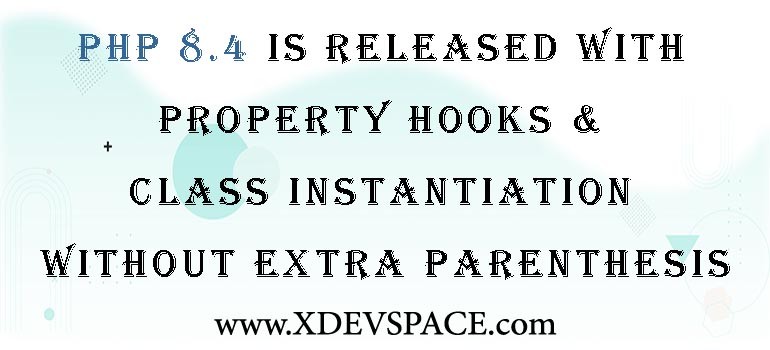
PHP 8.4 is released with Property Hooks, Class Instantiation without extra parenthesis

The PHP team has released PHP 8.4 with new array find functions, property hooks, class instantiation without extra parenthesis, and more:
- New Array Find Functions in PHP 8.4
- Property Hooks in PHP 8.4
- Class instantiation without extra parenthesis in PHP 8.4
- New
mb_trimfunctions - New
mb_ucfirst()andmb_lcfirst()functions - Asymmetric Property Visibility in PHP 8.4
- And more…
– See the PHP 8.4 RFC page for a complete list.
1 - New Array Find Functions
PHP 8.4 will come with new array find functions that include:
array_find()array_find_key()array_any()array_all()
See our post on the PHP 8.4 Array Find Functions.
2 - PHP Property Hooks
Property hooks are inspired by languages like Kotlin, C#, and Swift, and the syntax includes two syntax variants that resemble short and multi-line closures:
class User implements Named
{
private bool $isModified = false;
public function __construct(
private string $first,
private string $last
) {}
public string $fullName {
// Override the "read" action with arbitrary logic.
get => $this->first . " " . $this->last;
// Override the "write" action with arbitrary logic.
set {
[$this->first, $this->last] = explode(' ', $value, 2);
$this->isModified = true;
}
}
}Property hooks will help remove boilerplate of property getters and setters, allowing a property to define access and updates using hooks.
3 - new MyClass()->method() without parentheses
Since member access during instantiation was introduced, you must wrap the “new MyClass()” call in parentheses, or you'll get a parse error. The proposed syntax would allow you to access constants, properties, and methods without the extra parentheses:
// Wrapping parentheses are required to access class members
$request = (new Request())->withMethod('GET')->withUri('/hello-world');
// PHP Parse error (<= PHP 8.3): syntax error, unexpected token "->"
$request = new Request()->withMethod('GET')->withUri('/hello-world');This update fixes papercut that makes working with class member access simpler, not having to add surrounding parentheses or using a static constructor method. This syntax change also puts PHP more in alignment with other C languages like Java, C#, and TypeScript, which don't require surrounded parentheses.
4 - Create a DateTime from a Unix Timestamp
Creating a DateTime from a Unix timestamp will be more convenient in PHP 8.4, with the new createFromTimestamp() method. It will support both a typical Unix timestamp as well as timestamps containing microseconds:
$dt = DateTimeImmutable::createFromTimestamp(1718337072);
$dt->format('Y-m-d'); // 2024-06-14
$dt = DateTimeImmutable::createFromTimestamp(1718337072.432);
$dt->format('Y-m-d h:i:s.u'); // 2024-06-14 03:51:12.432000In earlier versions of PHP, there are a few ways to create a DateTime instance from a timestamp, such as the createFromFormat() method:
$dt = DateTimeImmutable::createFromFormat('U', (string) 1718337072);
// DateTimeImmutable @1718337072 {#7948
// date: 2024-06-14 03:51:12.0 +00:00,
// }
$dt = DateTimeImmutable::createFromFormat('U.u', (string) 1718337072.432);
// DateTimeImmutable @1718337072 {#7950
// date: 2024-06-14 03:51:12.432 +00:00,
// }5 - New mb_ functions
PHP has had trim, ltrim, rtrim, ucfirst, and lcfirst functions for a long time, and now in PHP 8.4 it adds 'mb_', multi-byte strings support for those functions.
mb_trim()mb_ltrim()mb_rtrim()mb_ucfirst()mb_lcfirst()
These all carry the same arguments as the original functions. These functions are from two separate RFCs: rfc:mb_trim and rfc:mb_ucfirst.
6 - Asymmetric Property Visibility
Starting in PHP 8.4, properties may also have their visibility set asymmetrically with a different scope for reading and writing. Here's an example from the documentation:
class Book
{
public function __construct(
public private(set) string $title,
public protected(set) string $author,
protected private(set) int $pubYear,
) {}
}
class SpecialBook extends Book
{
public function update(string $author, int $year): void
{
$this->author = $author; // OK
$this->pubYear = $year; // Fatal Error
}
}
$b = new Book('How to PHP', 'Peter H. Peterson', 2024);
echo $b->title; // How to PHP
echo $b->author; // Peter H. Peterson
echo $b->pubYear; // Fatal Error- Tags :
- php,
All Comments